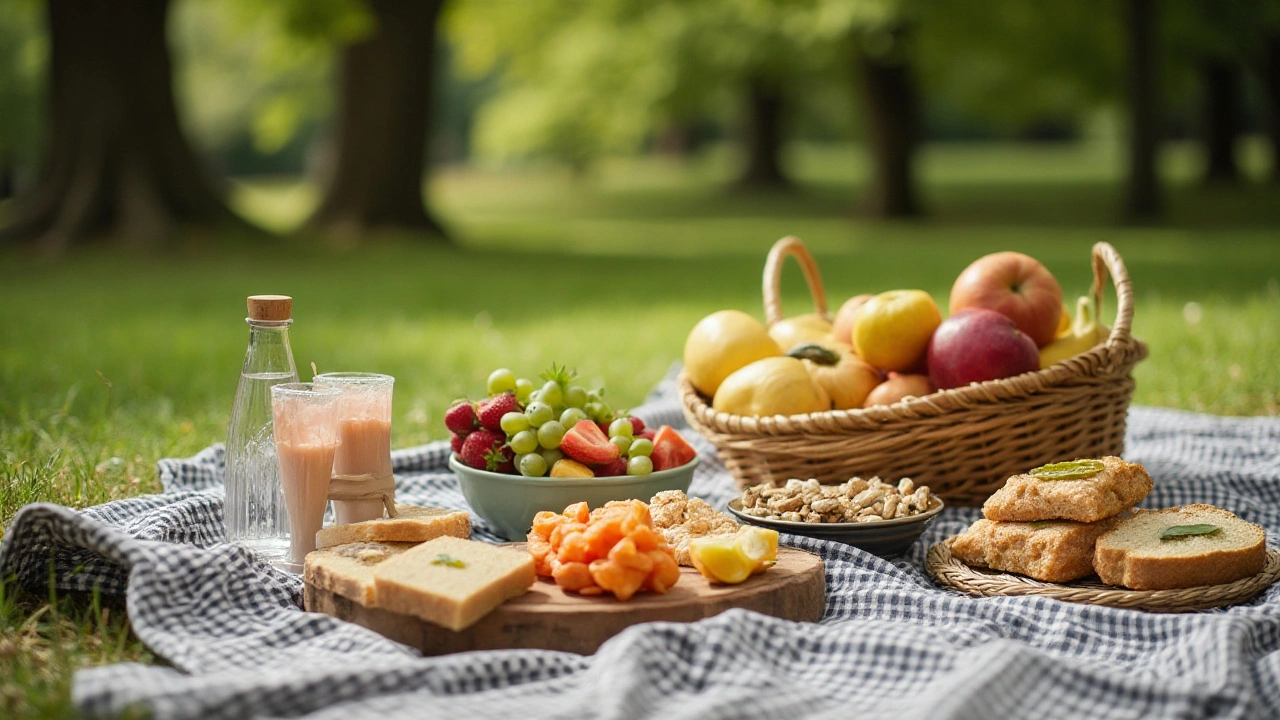In today's ever-busy society, eating healthy can feel like a monumental task. Whether you're juggling work, family, or a mix of commitments, there never seems to be enough time in the day. But here's the good news—maintaining a nutritious diet doesn't have to be time-consuming or stressful.
With some planning and smart choices, you can fuel your body with what it needs, even on the busiest of days. This guide shares practical insights into making nutritious eating part of your daily routine, so read on and discover easy yet effective tips to keep those health goals in check.
- Quick and Nutritious Meals
- Smart Snacking Strategies
- Meal Prep Tips
- Eating on the Go
- Essential Nutritional Knowledge
Quick and Nutritious Meals
Eating well doesn't have to be a time-consuming ordeal, and the key lies in simplicity. Creating meals that are both quick and nutritious can be a lifesaver for busy people juggling various responsibilities. It's all about choosing the right ingredients and keeping things uncomplicated. A nutritious meal doesn’t require gourmet skills; a little forethought goes a long way in maintaining a healthy diet. For instance, using simple techniques like one-pan dinners can make a wholesome meal approachable even on a tight schedule. Toss your protein, a variety of colorful veggies, and some spices together in a baking dish—then let the oven do the work while you tackle other tasks.
Prepping your protein sources ahead of time is a game changer. Think of grilled chicken or baked tofu, which are versatile and can be used in multiple ways throughout the week. You can chop them up for salads, add them to a stir-fry, or throw them into a quick wrap for lunch. It makes eating healthy feel almost effortless. There are also nutritious shortcuts you can consider, like opting for canned beans or frozen vegetables. These not only save you cleaning and chopping time but also maintain a high nutrient profile. According to a study published in the Journal of Food Composition and Analysis, frozen fruits and vegetables are often more nutritious than their fresh counterparts when consumer access is delayed, primarily because they are picked and frozen at their peak ripeness.
"A well-balanced meal doesn’t require an elaborate recipe but rather a mix of seasonal and accessible ingredients. Keep it simple, yet wholesome," suggests nutritionist Lisa Drayer.
To enhance the convenience factor, aim to have a few essential items on-hand that can form the base of many different meals. Whole-grain pasta, canned tuna, or quinoa are excellent foundations that pair well with various ingredients. Therefore, you can enjoy variety without too much complexity. Additionally, incorporating a healthy diet doesn't mean sacrificing taste—add flair with fresh herbs or a squeeze of citrus to brighten up dishes. Embracing a meal pattern like the Mediterranean diet can be beneficial. It's rich in fruits, vegetables, nuts, and lean proteins, which not only simplify cooking but also align well with nutrition tips known to support heart health.
In many cases, breakfast can be just as quick and nutritious. Overnight oats, for example, are a wonderful morning meal that can be thrown together in minutes. Combine oats, milk, yogurt, or a plant-based alternative, and a few of your favorite toppings—such as berries or nuts—in a container the night before. By the time morning rolls around, your breakfast is ready without any hassle. Consider smoothies as well, which require minimal prep. They are excellent vehicles for packing in fruits, vegetables, and sources of healthy fats such as avocados or nut butters. This approach ensures you're topping up on vital nutrients without needing to spare extra time in the morning rush.
Smart Snacking Strategies
Snacking can be a lifesaver when hunger strikes between meals, especially in the midst of a busy day. However, many people fall into the trap of grabbing whatever's convenient, often leading to unhealthy choices that provide little nutritional value. The key to smart snacking is planning and making informed choices that keep your energy levels stable and hunger at bay. Consider having a variety of healthy snacks on hand that are easy to grab and go.
A great snack choice is a mix of proteins, healthy fats, and fibers, which work together to keep you full and satisfied. For example, nuts and seeds like almonds or sunflower seeds are wonderful options because they are rich in protein and good fats. Pair these with a piece of fresh fruit or some vegetable sticks to add fiber and vitamins to your snack. During your grocery runs, look for snack options that are low in added sugars and high in natural ingredients. Whole grain products like crackers or rice cakes can be paired with avocado or hummus for an easy and nutritious treat.
Make Your Own
Preparing your own snacks at home can be a game-changer. Investing a little bit of time to make nutritious snacks in bulk not just saves money but also ensures you are aware of what goes into your food. Consider preparing energy balls made from oats, nut butter, and coconut. These can be stored in the fridge and consumed throughout the week. Another fun option is to create your own trail mix using dried fruit, nuts, and a sprinkle of dark chocolate chips for that occasional sweet tooth.
"Choosing the right snacks can help maintain energy levels and improve focus during busy work hours," advises nutrition expert Laura Thomas.
If you're someone who enjoys a crunchy snack, air-popped popcorn is a whole grain that can be flavored with a bit of seasoning to make it more exciting. Remember to keep portion sizes in check, as even healthy snacks can add up in calories if consumed mindlessly. It can be helpful to portion out your snacks ahead of time in containers or bags so you aren't tempted to eat straight from the package.
| Snack Type | Portion Size | Calories |
|---|---|---|
| Almonds | 1 handful (about 23 almonds) | 162 |
| Air-popped Popcorn | 3 cups | 93 |
| Energy Balls | 2 balls | 180 |
Emphasizing nutrition tips in choosing snacks can empower you to make better decisions that support your health even when life is moving at a fast pace. By regularly stocking up on healthy options and setting aside time to prepare homemade snacks, you can transform your snacking habits into a vital component of your healthy lifestyle. So next time you're in the snack aisle, remember these strategies for making smarter, more satiating choices.

Meal Prep Tips
For busy people, meal prepping can be a game-changer, making it easier to stick to a healthy diet even on the most hectic days. One effective strategy is to set aside a couple of hours each week for preparing your meals. Start by planning your meals for the week, considering your schedule to identify meals that can be cooked rapidly or prepared in advance. Once you have a plan, create a detailed shopping list, ensuring you have all the necessary ingredients, which helps prevent last-minute unhealthy choices.
When you're ready to cook, focus on recipes that yield multiple servings. Casseroles, soups, and stews can be ideal, as they tend to reheat well and can easily be stored in portioned containers. While cooking, you might find it productive to prepare components separately. For example, cook a batch of quinoa or brown rice to serve as a base for several meals through the week. Combine this with different proteins and vegetables for variety and nutritional balance. Vegetables like carrots, bell peppers, and broccoli are great additions because they retain their texture well after reheating.
"The effort you put into planning and preparing your meals can lead to healthier choices and less stress over daily eating decisions," says Ellie Krieger, a dietitian who has spent years educating folks about nutrition.Dedicated meal prep containers play a vital role in this process. Invest in quality, dishwasher-safe containers for storing each meal or ingredient separately. Clear containers can make it easy to see what's inside, while some prefer color-coded lids for quick meal recognition. Consider freezing meals that you don't plan to eat within a few days to ensure freshness.
Remember the importance of diversifying your meals. Repeating the same menu might lead to meal fatigue, which often tempts people away from their diet plans. By mixing up proteins, grains, and vegetables, you'll keep meals interesting. Try incorporating seasonal produce, which can introduce new flavors and keep meal prepping exciting. Spice and herb varieties, such as basil, thyme, or cumin, can make a great difference while adding minimal calories. One long-term study found that those who meal prep regularly tend to consume more vegetables and higher-quality meals. This points to the tangible health benefits meal prepping can offer.
| Component | Quantity |
|---|---|
| Quinoa | 500g |
| Chicken Breast | 1 kg |
| Mixed Vegetables | 1 kg |
Eating on the Go
In a world where our schedules often dictate our choices, eating on the run can be an unavoidable part of life. Yet, with the right strategies, you can make nutritional decisions that don't compromise your health even when you are pressed for time. The key is planning and selecting convenient yet healthy diet options. One effective strategy is to prepare a list of go-to healthy meals that you can either make ahead of time or assemble quickly. Pre-packaged foods at the grocery store may be tempting, but they're often loaded with sodium and sugar.
One option is to invest in a cooler bag or an insulated lunch box. This will allow you to transport perishable items like salads, fruits, and sandwiches without worrying about spoilage. In fact, keeping fresh fruits and veggies handy isn't just a smart move for your diet, it adds vibrant nutrients that fuel your productivity throughout the day. If you're driving, try eating soft fruits like bananas or mixed nuts, which don't require utensils or much focus.
Another option to consider is the power of a good protein shake. Many nutritionists recommend them as they're quick to prepare and easy to carry. They can provide the energy you need without the sugar crash of typical snack foods. A mix of protein powder, some almond milk, a handful of spinach, and your favorite fruit made in the morning can keep you full until your next meal. According to a study published in the Journal of Nutrition, people who manage a healthy diet on the go usually report better energy levels and concentration.
"Eating well when you're short on time doesn't have to be complicated—it's about making smarter choices," says Michael Pollan, author of 'In Defense of Food'.
Lastly, keep a stash of healthy snacks in your work desk, car, or bag. Things like granola bars (preferably the ones with less sugar), trail mix, or whole-grain crackers can make a big difference when hunger hits. It's all about keeping your hunger satisfied while maintaining energy levels necessary for a busy lifestyle. Remember, the goal of eating on the go should not only be about convenience, but also about how to sustain and support your body's needs throughout your hectic day.

Essential Nutritional Knowledge
Understanding the basics of nutrition is like holding a compass on your quest for a healthy diet. Grasping the fundamentals can empower you to choose foods that nourish both body and mind, no matter how busy life gets. Let's start with a simple yet profound fact: your body needs a balance of five key nutrients—proteins, carbohydrates, fats, vitamins, and minerals—to function at its best. These nutrients work in harmony, supporting everything from energy production to immune health, and yes, even your mood. Proteins are the building blocks, vital for repair and growth, while carbohydrates are your body's preferred energy source, fueling those long days.
Healthy fats are just as crucial, despite the bad press they sometimes receive, as they are important for brain health and cell function. Vitamins and minerals, though needed in smaller amounts, are equally essential, serving as catalysts in various bodily processes. Have you ever considered the role of hydration in a balanced diet? It's easy to overlook the simple glass of water, but staying hydrated can improve concentration, prevent headaches, and even help control cravings, making it a wellness whisperer in your dietary routine.
Whole grains like brown rice and oats should be your go-to for long-lasting energy, while fresh fruits and vegetables deliver a rainbow of vitamins and minerals crucial for optimal health. It might feel overwhelming at first, but remember, it's about gradual changes. Swapping out simple carbs for complex ones or choosing lean proteins like fish or legumes can make a world of difference. And those labels on the back of packaging? They're not just fine print. They hold the clues to understanding what you're really putting in your body. Pay attention to ingredients lists and nutritional facts, as they can guide you towards making healthier choices.
"Let food be your medicine and medicine be your food." - Hippocrates
Some experts recommend filling at least half your plate with fruits and vegetables, which can effortlessly increase your intake of vitamins and minerals. A colorful array of produce offers a variety of benefits. For example, dark leafy greens are rich in iron and calcium, citrus fruits provide ample vitamin C, and nuts and seeds are excellent sources of healthy fats and fiber. Additionally, whole foods typically contain fewer additives and preservatives, making them better choices for your nutrition tips.
To make informed choices, be familiar with nutritional labels, which list ingredients, calories, and macronutrient breakdowns. Understanding the difference between healthy and unhealthy fats, such as those found in olive oil versus trans fats in processed foods, is invaluable. Protein consumption should account for roughly 10-35% of your total daily calories. Consider plant-based proteins, such as beans and lentils, that offer fiber and lower cholesterol, as alternatives to meat-based counterparts. By focusing on nutrient-dense foods, you can maintain your health while navigating a busy schedule.
A balanced approach to micronutrients can also enhance well-being. Incorporating foods that support various body functions ensures you're getting well-rounded nutrition. Calcium-rich sources like dairy or fortified plant-based milks bolster bone health, while antioxidant-packed berries can combat oxidative stress. Embrace whole grains, including quinoa or whole wheat bread, for B-vitamins and energy. This holistic strategy emphasizes sustainable choices that harmonize with your lifestyle and health goals. It's less about eliminations and more about creating a delicious, nutritious, and sustainable way of life, even in today's fast-paced world.






